Accounting Firm Online Reputation Management: It's Important
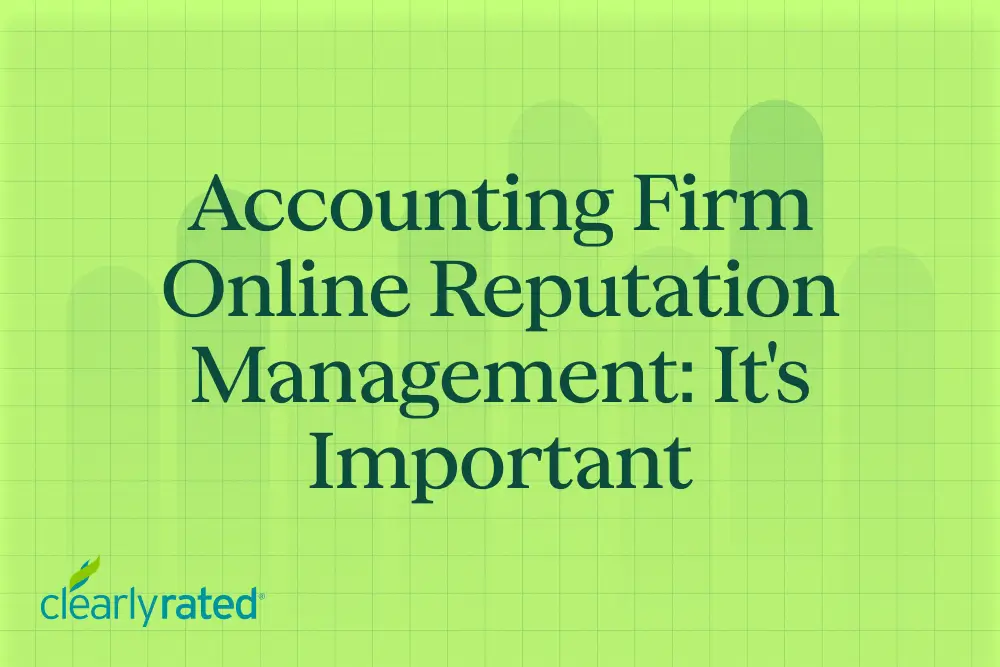
- Managing your accounting firm’s online reputation is crucial for building trust, attracting clients, and ensuring long-term success. Regularly monitoring reviews and responding to feedback helps prevent reputation damage and improve client relationships.
- Positive reviews and timely responses enhance your online visibility and search engine rankings. Consistent, positive content on platforms like Google and social media boosts your firm’s credibility and visibility to prospective clients.
- Using tools like ClearlyRated helps gather and share client feedback, track NPS scores, and showcase testimonials, leading to stronger relationships, increased client loyalty, and new business opportunities.
- Responding professionally to negative reviews and identifying recurring issues enables you to turn criticism into actionable insights, helping protect and grow your firm’s reputation over time.
People often get the wrong idea about online reputation management and what it actually includes. Some think it only includes checking social media, while others confuse it with old-school public relations. Many don’t even realize how much one negative review can damage trust and potentially cost them business.
If you run an accounting firm, managing your online reputation may feel difficult sometimes. But you don’t need to do everything at once to stay on top of it. With the right tools and a clear process, you can reply fast, track what people say, and protect your firm’s image before minor issues turn into bigger ones.
In this guide, we’ll break down everything about accounting firm online reputation management, including what it actually involves, why it matters, and what steps help you keep your reputation strong.
Why Online Reputation Management Matters for Accounting Firms
For accounting firms, whether you have three employees or three hundred, people are talking about you online, through reviews, ratings, and posts on Facebook, LinkedIn, Google, and industry-specific sites.
Ignoring this feedback risks letting negative impressions grow unchecked, which is why online reputation management should be a core part of your accounting firm growth strategy.
1. Trust and credibility in a digital age
Trust starts with your online presence, especially when people have many accounting firms to choose from. Positive reviews help you build trust quickly because they show real proof of your good work. At ClearlyRated, we help clients ask for, gather, and share reviews in ways that show what they do best.
Similarly, negative reviews happen even to well-managed firms. The difference lies in how you respond. A fast, respectful, and helpful reply can protect your brand reputation and sometimes win back an unhappy client, with 88% of consumers preferring businesses that respond to every review (versus 47% for those that don’t).
2. Reputation-led growth and market visibility
When search engines see regular reviews and timely responses, they rank your pages higher. That means more people find your firm when they search for services like yours.
Reviews and ratings also influence how search algorithms decide which firms to display first. Adding fresh, positive content to your profiles boosts your search performance. For accounting firms competing locally, accurate business listings and active review management can make the difference between ranking on page one or getting buried in results.
3. The intangible value of reputation
When someone needs accounting services, their first step is usually an online search. That initial interaction often determines their opinion of your firm before they ever speak with you. This means an accounting firm's online reputation is shaped by client reviews, social media mentions, and what search results reveal. Most prospects, around 96%, research companies and services before speaking with a sales representative.
JA Del Río, a global accounting firm, turned to ClearlyRated to track client experience using NPS surveys. With consistent feedback in hand, they improved internal communication, strengthened client relationships, and identified service gaps before they became issues.
As a result, they’ve earned a consistent world-class NPS score, a 4.6-star client rating, and hundreds of new testimonials. Their team has used this feedback to uncover new business opportunities and strengthen client relationships across global markets. The firm also became a two-time winner of the Best of Accounting Client Satisfaction award, giving them a powerful edge in both marketing and sales.
How NPS Reflects Client Trust and Drives Growth
In accounting, your NPS is a direct reflection of your firm’s reputation and the trust you’ve built with clients.
NPS as a loyalty and referral indicator
When clients trust your accounting firm, they’re far more likely to stay and refer others. NPS captures this sentiment in a single metric by measuring how likely clients are to recommend your services. High scores signal strong loyalty, while low ones highlight gaps that could hurt your reputation if ignored.
A 2025 CapIntel survey found 72% of investors rank trust as the top factor in choosing an advisor, more than investment experience (50%) or holistic perspective (46%). More importantly, 61% said they would leave after a breach of trust, compared to 54% who would leave due to poor performance. Clearly, trust drives both retention and referrals.
Promoters, or clients who score you highly, are also more likely to give testimonials that help with both retention and acquisition. Regular NPS surveys help you track how clients feel, identify detractors early, and fix problems before they grow.
For example, Perkins & Co., an accounting firm in Portland, used NPS feedback to improve their service. They raised their NPS to 84, well above the industry average, which helped them earn more referrals and win the “Best of Accounting” award.
Accounting-specific NPS benchmarks
NPS for accounting firms tends to be lower than in many other industries, making high scores a competitive edge. ClearlyRated’s Annual Survey Benchmark Study for Accounting Firms reported an industry average NPS of 38 in 2021, rising slightly to 41 in 2023 before falling back to 38 in 2024.

The drop from 2023 to 2024 was likely caused by declines in responsiveness (down four points), service timeframes (down two points), and perceived value for cost (down one point).
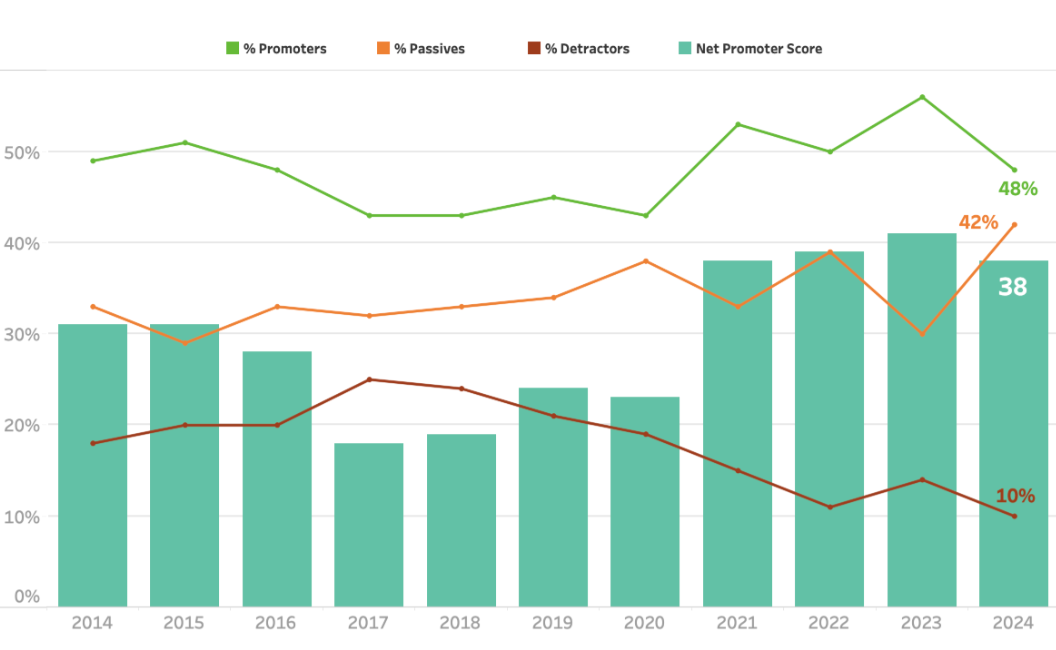
Although the industry has shown improvement over recent years, this reversal is concerning in a field already lagging behind global NPS standards. On a global scale, an NPS of 50 earns an “excellent” label, and a 70 places a company in the “world-class” category.
When firms use client feedback to improve their accounting firm client experience, they can build stronger trust, gain more positive reviews, and secure the long-term benefits that come from a solid reputation.
Practical Strategies for Accounting Firms
Strong client trust builds a lasting professional relationship. That trust depends a lot on how well you manage and protect your accounting firm’s online reputation. Every step you take to encourage good feedback, share client stories, and connect with your audience affects how new clients see your services.
1. Encourage client reviews
For accounting firms, trust is everything, and one of the fastest ways to build it is through positive online reviews. Everybody texts, and that’s exactly what makes SMS one of the most effective, convenient ways to request them. High open rates mean your review request is likely to be seen almost immediately, but only if clients have opted in to receive texts first.
Here are some simple ways to collect those opt-ins:
- Prompt clients to text a keyword like ACCOUNTING to your business number
- Add an SMS chat widget to your homepage so clients can start text conversations with you
- Include text consent options in contact and registration forms
- Ask clients in person and note their preference in your contact records
- Let clients text you first to open the channel
- Send a short follow-up survey link via SMS after a successful project, making it easy for clients to leave a public review in the same interaction
- Add your preferred review platform links to your SMS signature so clients can click directly from your message
Once you’ve got permission, keep your messages short and consistent. Pre-made text templates make this easier and ensure all employees send requests in the same tone.
For example, you can send texts/emails like:
"Hi [Client's Name], we hope you had a great experience with our accounting services. Would you mind sharing your thoughts in a quick review? [URL] Thank you!"
2. Showcase testimonials and thought leadership
Clients share testimonials to show the real value and quality of your work. These testimonials often help people pick between different accounting firms. Reach out to happy clients and ask them to give specific feedback about your service.
Take a look at how ClearlyRated features client testimonials directly on their website for added credibility:
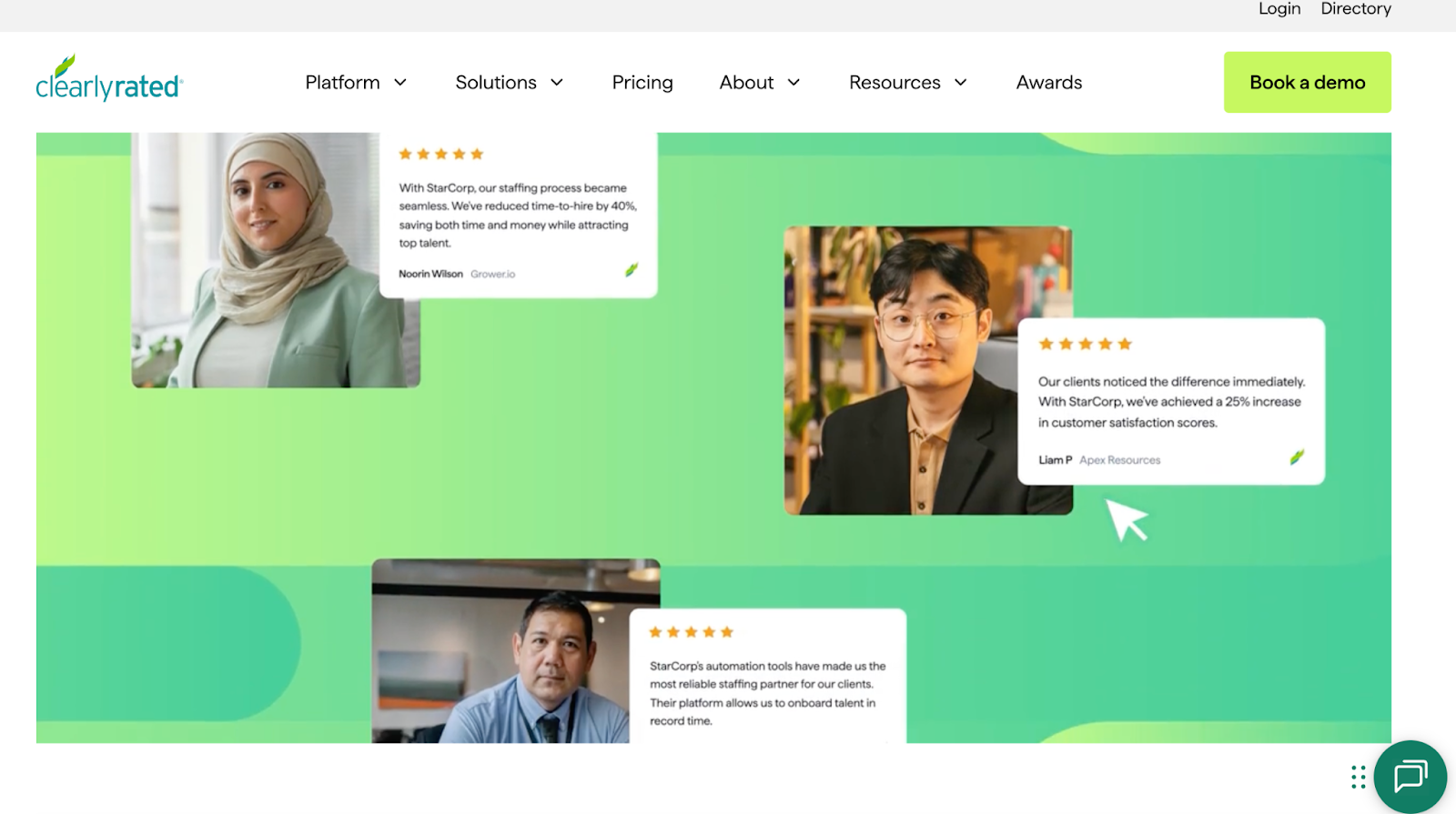
On the other hand, thought leadership content, such as informative blog articles, industry updates, and expert commentary, also strengthens credibility. Here are a few specific ways to make it work for you:
- Write articles on new tax rules, changes in compliance, or give simple money tips for business owners
- Post the content on LinkedIn, Twitter, or niche forums where potential clients already spend their time online
- Use the articles to answer common client questions and address specific pain points you’ve seen firsthand
If you don’t have time to manage the process, hire a team that focuses on online reputation management for accountants to handle everything from writing to distribution.
3. Maintain accurate business listings
Your Google Business Profile is one of the most powerful tools for boosting visibility and shaping your firm’s online reputation. For example, ClearlyRated’s well-optimized profile showcases how a complete listing can inspire confidence and attract leads.
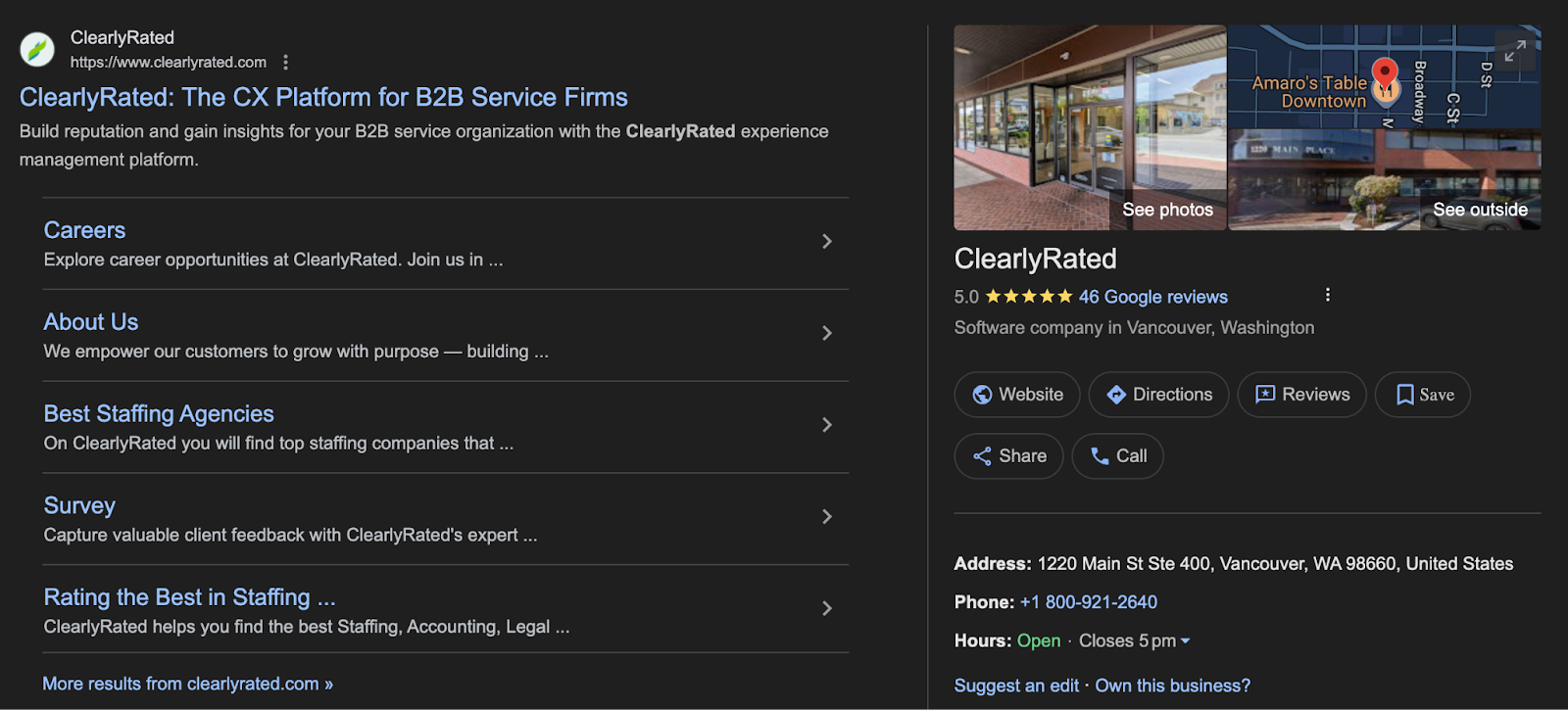
However, you need to verify your business profile before it goes live. The process is simple, where Google will mail a postcard with a code, typically within five business days. Once verified, double-check every detail:
- Business name
- Address
- Phone number
- Operating hours
A fully optimized profile can help prospective and existing clients quickly understand your services and build trust. Focus on these key areas:
- Description: Use your characters wisely to describe your firm and naturally include relevant keywords like bookkeeping, tax planning, or payroll
- Categories: Choose the most accurate categories to reflect your accounting services
- Service listings: Detail each service you offer so prospects know exactly how you can help
- Regular updates: Post news, service changes, industry insights, or special offers to keep your profile active and engaging
Done well, your Google Business Profile becomes a 24/7 marketing asset that draws in the right clients and supports your reputation.
4. Leverage social media
Social media gives accountants a direct way to communicate with clients and prospects while showing their expertise. Posting regularly keeps your firm visible and creates the impression that you stay active and responsive.
To use social media effectively:
- Share helpful content, such as how-to guides, tax reminders, and brief industry updates
- Engage with followers by responding promptly to comments, thanking people who share your posts, and joining conversations about accounting and finance
Take a look at this LinkedIn post:
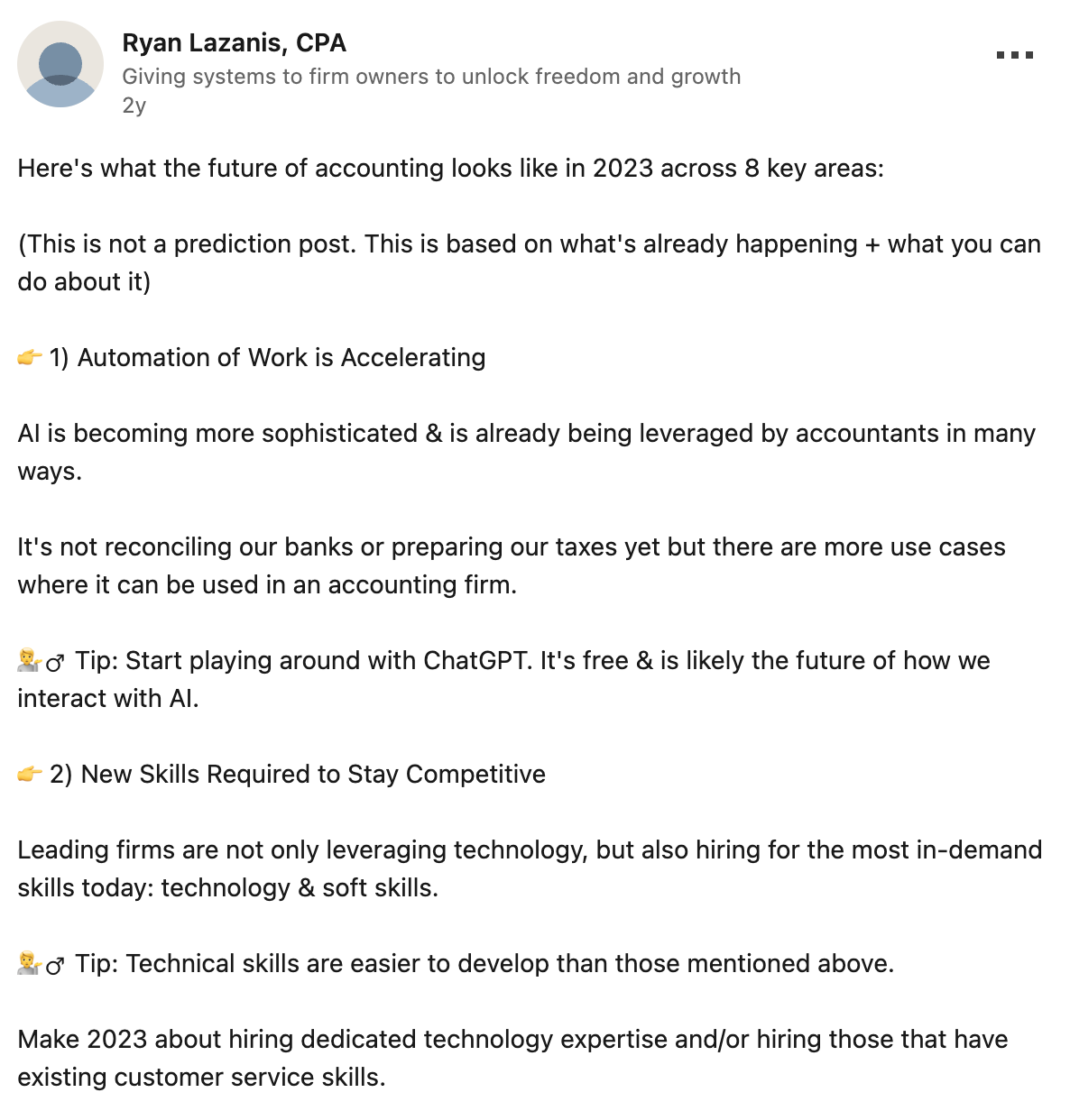
The post above focuses on value, uses a teaser to spark curiosity, and keeps captions under five lines. These interactions humanize your brand, strengthen trust, and keep your audience connected over time.
5. Handling Negative Reviews
Even the most careful accounting firms will receive occasional negative reviews, making it vital to have a clear plan for addressing it without harming client relationships:
Respond publicly with empathy and offer offline resolution
When clients post negative comments, respond openly and respectfully to acknowledge their frustration while offering a private way to resolve the issue. For example, if a client complains about a delayed tax filing, reply:
"Thank you for sharing your experience with us. We understand how delays in tax filings can affect your trust. Please contact us directly at [phone number] or [email address] so we can discuss this matter and work toward a quick resolution."
This balanced approach shows your accountability, reassures other readers that you take every concern seriously, and directly supports online reputation management for accountants by showing you act rather than ignore feedback.
Identify trends in repeated complaints to drive service improvement
To turn negative feedback into action, start by spotting patterns in client complaints and respond with clear changes:
- Log specific issues to spot recurring problems over time
- Look for repeat mentions of problems like delayed reports or poor communication
- Take targeted action, such as improving workflows, adding checks, or assigning clearer task ownership
- Focus on fixing the root cause so the same issues don’t damage your reputation
Responding consistently to feedback builds trust faster than addressing complaints one by one. Over time, this approach turns criticism into a tool for long-term loyalty and stronger client relationships.
Measuring Impact
Use clear metrics and review them regularly to track the performance of your online reputation strategy.
Tangible outcomes of online reputation management + NPS
Track shifts in NPS and compare them with changes in review volume and quality to measure progress. A higher NPS combined with more five-star reviews shows your communication strategy builds trust.
For example, if your NPS moves from 45 to 60 within six months, while five-star reviews increase by 30%, you can directly connect your communication efforts to client sentiment. This helps you identify which actions created the strongest positive shifts in perception.
ROI from NPS-driven online reputation management
To measure ROI, compare how much you spend on reputation work to the revenue it brings in. For example, if you spend $2,000 each month on feedback, responses, and updates, and retain five clients worth $5,000 each per year, that gives you $25,000 in annual return from that effort alone.
By tracking both financial gains and improved client loyalty, you can justify budget allocation and refine strategies to deliver stronger results over time.
Why ClearlyRated Is Built for Accounting Reputation Management
Customers often give as much weight to online reviews as they would to personal recommendations from friends or colleagues.
As an online reputation management platform for accountants, ClearlyRated gives accountants practical tools to collect feedback, share client success stories, and consistently grow a strong reputation that attracts new business.
- Testimonials & shoutouts: ClearlyRated lets clients post reviews directly to Google so your positive feedback reaches a wider audience without extra steps. You can also gather star ratings instantly and create team member “Shout Outs” that spotlight exceptional service as it happens.
- Marketing toolkit: With ClearlyRated, you can actively promote wins by sharing awards, reviews, and testimonials on LinkedIn, your website, in email signatures, and even in press releases. Highlighting ClearlyRated’s “Best of” award badges within your messaging helps reinforce your reputation as a trusted, high-performing accounting partner. These assets make it easier to turn client praise into marketing material that draws new business opportunities.
- Awards & public directory: ClearlyRated’s “Best of” awards publicly recognize B2B service firms that achieve exceptional client and candidate satisfaction. Winners are chosen based on verified feedback from third-party surveys, which means authentic client voices back every award. Only firms with satisfaction scores that exceed industry averages receive this recognition, giving prospects a clear signal of proven quality.
Protecting Your Accounting Reputation with ClearlyRated
Listening to customers and acting on their feedback plays a direct role in protecting your brand’s credibility. Replying to criticism online helps control the conversation, and building a strong SEO strategy increases positive visibility over time. These efforts work well for most situations, but targeted smear campaigns require stronger measures to defend your business.
ClearlyRated gives you a proven way to collect verified reviews, showcase client success, and protect your accounting firm's online reputation from unfair attacks. Book a demo today to see exactly how our platform strengthens trust and drives measurable results.
FAQs
How can NPS boost my firm’s reputation?
NPS measures client satisfaction with clear feedback, showcases positive experiences, attracts new clients, and reveals areas to improve your firm’s credibility and reputation.
What’s a good NPS score for accounting firms?
A score above 50 reflects strong client loyalty for accounting firms, while 70 or higher signals exceptional service quality, trust, and satisfaction compared to industry standards.
How do I respond to negative reviews effectively?
Acknowledge the concern, thank the reviewer, offer context without defensiveness, and invite them to resolve the matter privately to protect professionalism and show commitment to client care.
FAQs





.png)


%20(1).png)

.webp)
.png)

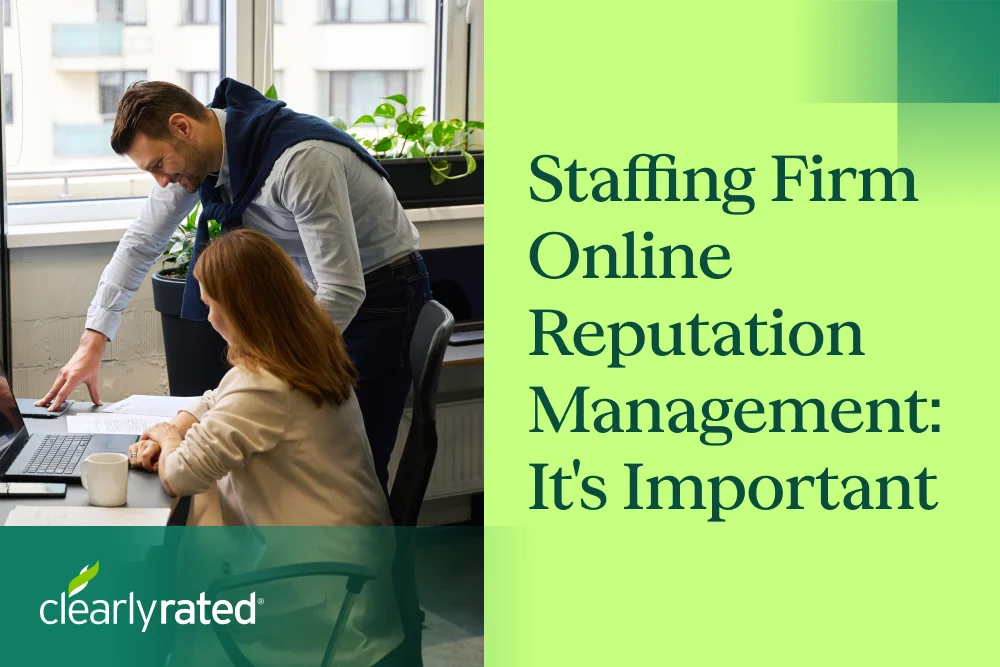




%5B1%5D.webp)







.png)






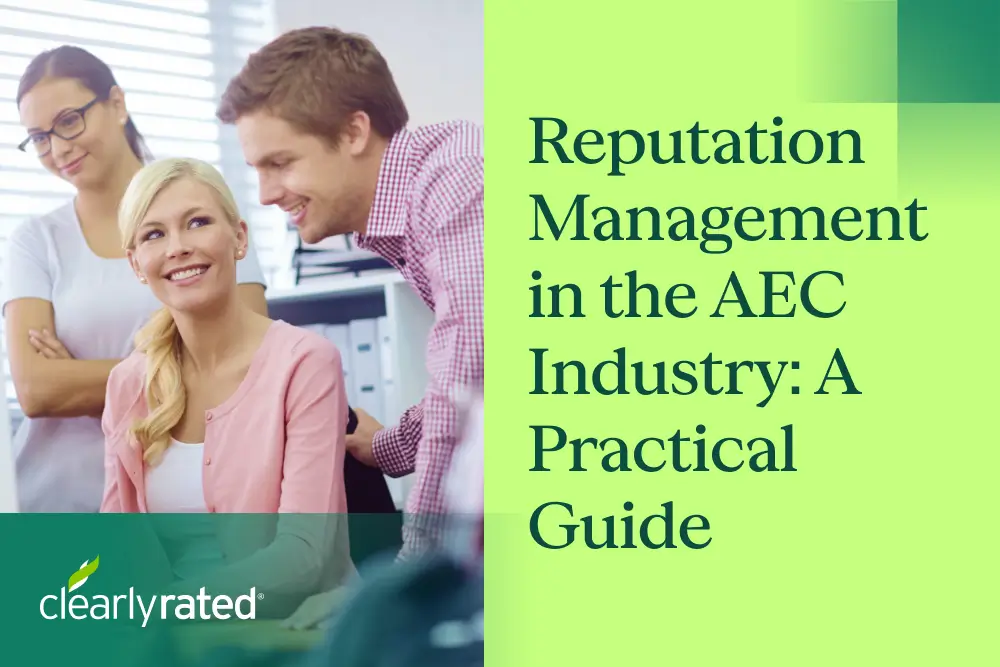



_%20The%20Ultimate%20Guide.png)
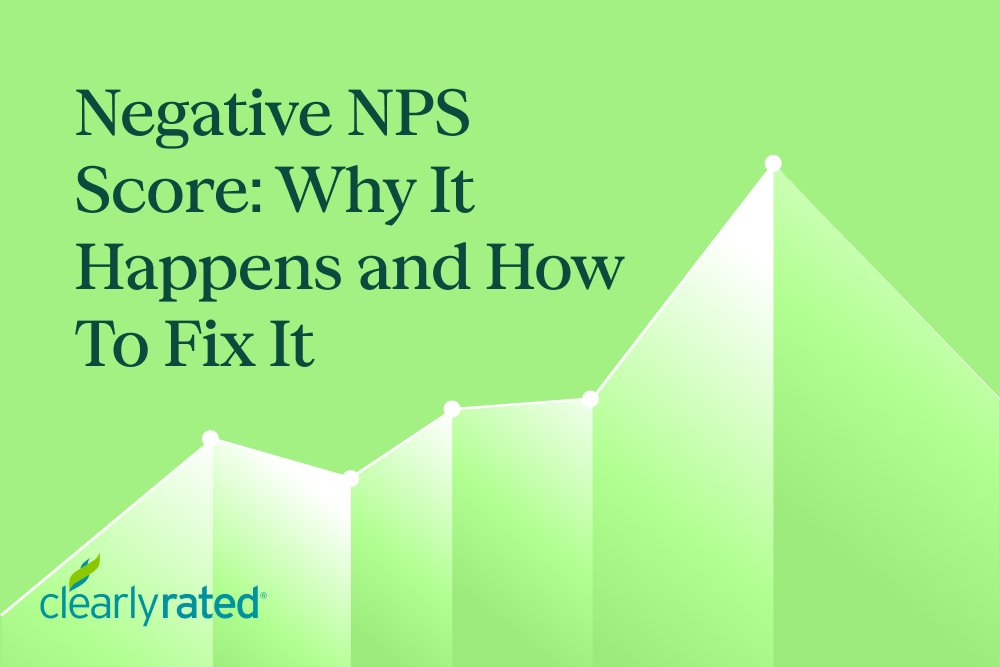




.png)










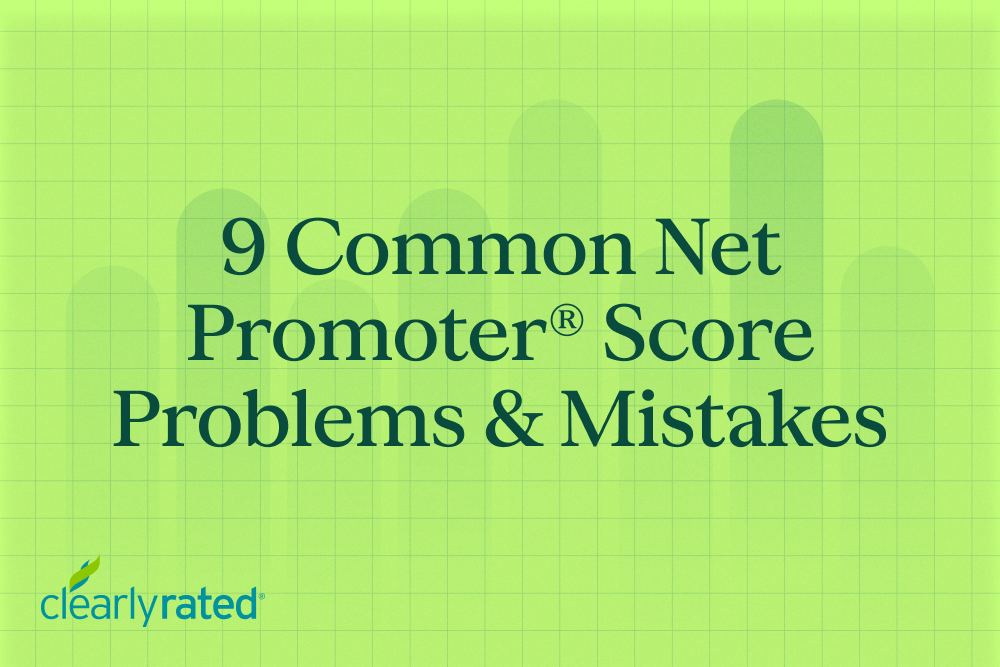









%20in%20the%20Workplace.png)










.png)

%20and%20how%20can%20you%20increase%20it.png)
_%20A%20Step-by-Step%20Guide.png)

.png)
.png)




_.png)



%20in%202028.png)


_%20The%20Ultimate%20Guide%20(2024).png)






